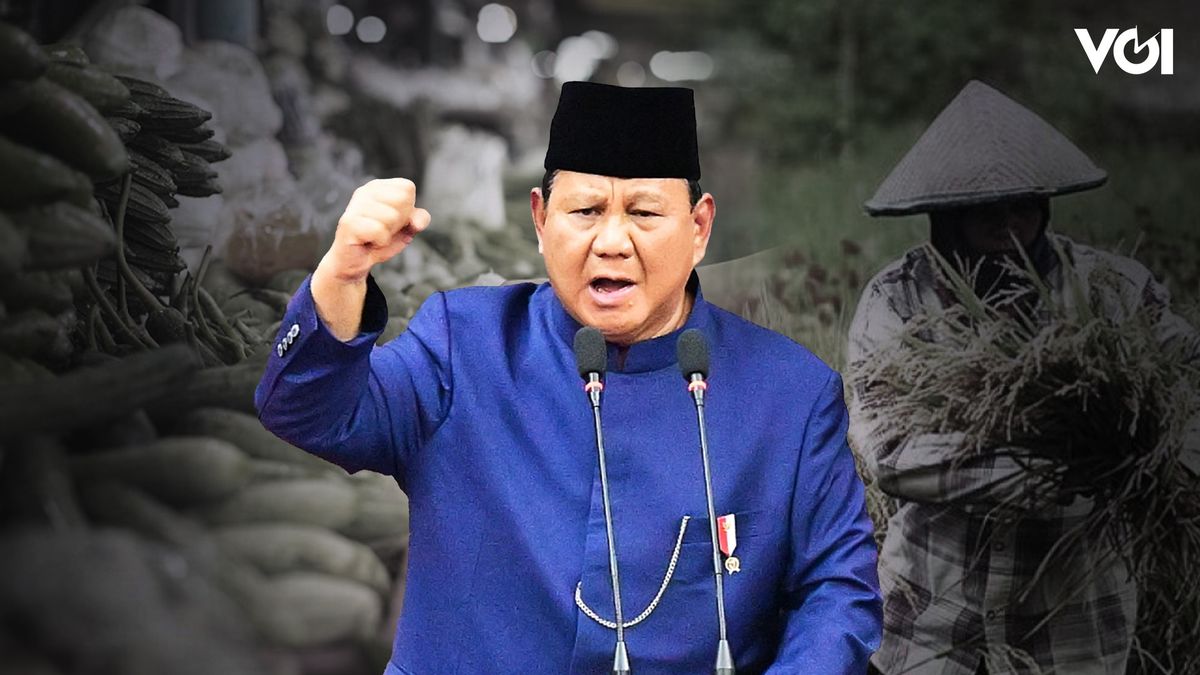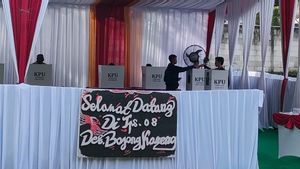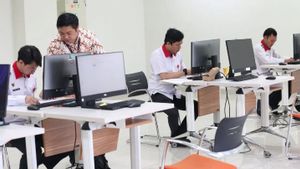JAKARTA - The demographic bonus is expected to occur in 2020-2035, where the number of people of productive age (15-64 years) is greater than the population of non-productive age (65 years and over). During that period, President Prabowo Subianto's administration will lead. So it is not surprising that President Prabowo finds it important to carry the theme of food security in his speech at international forums such as APEC forums and to a number of countries in his first visit as president.
He wanted to remind the potential and impact of food security amid extreme climate situations such as El-Nino and La-Nina, as well as global warming. Coupled with the world's geopolitics conditions that are currently facing war, such as the Russia-Ukraine war, the war in Myanmar, Burkina Faso, Ethiopia, Sudan and the war in the Middle East region between Israel-Palestinians that dragged 10 neighboring countries such as Iran, Iraq, Egypt, Qatar, Syria, Jordan, Saudi Arabia, the United Arab Emirates, Yemen, and Lebanon. Not to mention the trade war if it is not considered a cold war between China and America. So that the world is currently facing economic contraction.
SEE ALSO:
This condition forces the world to be prepared to face food shortages for its people. The Indonesian Minister of Foreign Affairs, Retno Marsudi in the National Seminar at Lemhanas RI in October 2022, once said that it was estimated that around 179 to 181 million people in 41 countries would face a food crisis.
So that the demographic bonus that occurs in Indonesia, can be an opportunity as well as a challenge for Indonesia, whose population as of June 30, 2024 is 282,477,584 people. So it is important for President Prabowo to prepare food availability for his people. Prabowo admitted in his speech in front of the APEC Summit CEO forum that as many as 25 percent of Indonesia's population is threatened with hunger. BPS data also confirmed that the number of poor people in March 2024 reached 25.22 million people, this figure is the lowest in the last decade.
Therefore, Prabowo Subianto in his program, focus on improving children's nutrition and food self-sufficiency. With a focus on improving children's nutrition and food self-sufficiency, President Prabowo wants to direct Indonesia to take advantage of the demographic bonus momentum for progress. The welfare of the younger generation and food independence are the keys to Indonesia's success towards the golden era of development.
Because there is no value if the demographic bonus contains human resources that are not superior and of high quality. To create quality and superior human resources, it is necessary to improve the nutrition of the intake provided. So Prabowo wants to boost this nutrition with a free lunch program for school students.
Dr. Anung Sugihantono, M.Kes, Director General of Nutrition and Maternal and Child Health, during the commemoration of National Nutrition Day reminded that human intelligence is closely related to nutritional intake. A child who experiences disorders due to deficiencies in iodine and nutrients will experience a loss of intelligence of 10 50 IQ points. Children with low intelligence are feared to become a burden in the future. In addition, nutrition also has a close relationship with the mortality rate of children under 5 years old.
Increased Children's Nutrition And Food Self-Sufficiency
Therefore, Prabowo Subianto, in his national vision of development, has emphasized the importance of improving children's nutrition as part of a major strategy for the development of Indonesian human resources (HR). The following are strategic steps designed to achieve this goal.
Prioritizing children's nutritional improvement programs through various approaches include Providing Additional Food (PMT). This program has previously been developed since President Susilo Yudhoyono, providing supplementary foods rich in nutrients such as local-based eggs, fish, and vegetables. This focus is on children in rural and remote areas.
Food Fortification Efforts: namely increasing nutritional content in staple foods such as rice, cooking oil, and salt with additional iron, iodine, and vitamin D. Nutrition education efforts for pregnant women and toddlers: A national campaign is intensified to provide education to mothers about the importance of nutrition during pregnancy and a period of 1,000 days.
To ensure this nutrition program runs optimally, the government needs to promote access to Health services, improve posyandu facilities in villages that are strengthened by equipment and health workers to monitor the nutritional status of children periodically.
President Prabowo also focuses on self-sufficiency in food, to support nutrition improvement while ensuring food security. Several strategies for this effort. Among other things, by revitalizing agriculture, such as supporting farmers by providing fertilizer subsidies, providing modern agricultural equipment, and easy access to capital.
The government also needs to encourage diversification of food sources so that people do not depend on rice, but can take advantage of other foods such as tubers, corn, sago, and marine products.
In developing agricultural technology, the government needs to make massive investments in agricultural research and technology, such as smart irrigation, use of drones for applications on agricultural land, and development of superior seeds that are resistant to climate change.
As for the expansion of productive land, the government needs to optimize sleeping land and open new land while still paying attention to environmental sustainability aspects. Cooperation between agencies, to integrate national food policies with the relevant ministries to ensure supply chains run smoothly and food prices remain stable.
The government also needs to establish partnerships with the private sector and communities. Government and private sector collaboration, as well as local communities in producing, distributing, and promoting nutritious food are deemed necessary. The "Kampung Nutrition" program, for example, is one example where people are actively involved in producing quality local food.
It needs to be a special concern for food-prone areas. Some areas that are prone to food shortages such as East Nusa Tenggara (NTT) and Papua must be a concern. The government has previously accelerated the development of logistics infrastructure, such as roads and ports, at least it can encourage growth rates and ensure food distribution to remote areas smoothly.
The impact expected with the implementation of this strategy, Indonesia is able, stunting rates decrease, improve children's health so that they are more prepared to compete globally. As well as achieving food self-sufficiency that not only meets domestic needs but also opens up export opportunities.
MSB Program Implementation Problem
Deputy Chairman of Commission II of the Indonesian House of Representatives from the Golkar Party, Zulfikar Arse Sadikin, said that Prabowo's government program, which will focus on improving nutrition and food security, is confident that it can be implemented. Answering the doubts of many parties regarding the availability and readiness of the budget, considering the condition of the state budget which is still in deficit.
"Regarding the budget, it can be disbursed, it can be from the state budget, it can be from the parents of students, from CSR, and the local government. From the program concept, it's ok, it's just a matter of implementation," said Arse to VOI, November 23.
According to him, as a tropical and maritime country, the potential for food is extraordinary. So if you want it to be implemented seriously, it's just a matter of implementation. If the program according to him, it's ok. There are no problems with the budget, it can be held. For example, by combing the budget that is not a priority, such as reducing the official travel budget. Regarding the budget, according to him, there are no difficulties. it's just a matter of implementation.
Reportedly it has started, with the issuance of a Circular Letter of the Minister of Finance Sri Mulyani Indrawati asking ministers to head institutions to save on official travel expenses. This policy is in accordance with President Prabowo Subianto's directives in cabinet sessions on October 23 and November 6, 2024.
According to the Deputy Chairperson of the Commission in charge of Domestic, ASN and Land Governments, if the existing funds are insufficient, it can use CSR funds. According to him, in many countries it also involves CSR. If it is not enough, the local government can take care of it. Such programs have been carried out during the SBY era, with the PKH (Family Hope Program) program where there is additional feeding.
He suggested involving Bumdes (Village Business Agency) in the implementation of the Nutrition Lunch (MSB) program to grow economically in the village. No need to create new organizations and devices so that funds are needed again. The supplier of materials is also handed over to them, the government just monitors the implementation and report
The English, Chinese, Japanese, Arabic, and French versions are automatically generated by the AI. So there may still be inaccuracies in translating, please always see Indonesian as our main language. (system supported by DigitalSiber.id)















